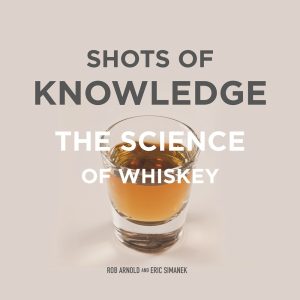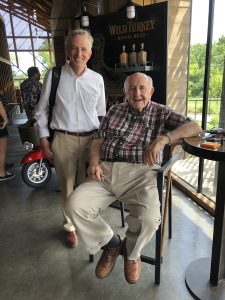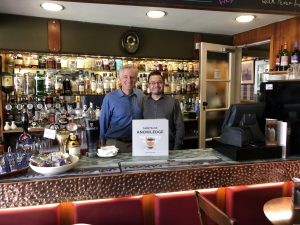Barrel-Aged Knowledge
You could say that TCU Whiskey School has aged quite nicely. The coursework is every bit as nuanced as the peatiest Scotch, and the six-year-old class’s professor, Dr. Eric Simanek, delivers highly refined, balanced, and complex lectures that combine economics, politics, and science as they relate to whiskey.

The researcher, author, and Robert A. Welch Chair of Chemistry told me that he has always enjoyed teaching courses that use science as the launching pad for discussions of topics that traditionally lie outside the realm of what is considered science. During his previous work on faculty at Texas A&M University, Simanek taught a Cowboy Organic course to agriculture students. The chemistry professors weren’t keen on teaching the class, but Simanek found that he loved teaching the applications of chemistry to farming.
Several years ago, Simanek began toying with the idea of offering a class to any undergraduate who wanted to learn about the science and history of whiskey.
A chance encounter with distiller Rob Arnold in 2014 resulted in Simanek and Arnold collaborating on Shots of Knowledge: The Science of Whiskey, published by TCU Press in 2016. Arnold was looking for lab space to isolate yeast strains that would later make Firestone and Robertson Distilling Company an internationally renowned whiskey producer.
“I wanted to teach a class on whiskey,” Simanek recalled. “Here is [a] distiller and he’s interested in collaborating. The book is a journey through the scientific aspects of making whiskey.”
 Shots of Knowledge was a finalist for the 2017 Gourmand World Cookbook Awards and laid the basis for TCU Whiskey School. At the time of our interview, Simanek was wrapping up a summer session of the whiskey class. He said his students are majoring in business, political science, and theater, among other fields. The course’s curriculum has evolved over the years, Simanek said. History portions have balanced out chemistry sections, and the average class size is 11 students. That number allows Simanek to fit everyone in a 12-passenger van for field trips to local distilleries where students speak with industry professionals.
Shots of Knowledge was a finalist for the 2017 Gourmand World Cookbook Awards and laid the basis for TCU Whiskey School. At the time of our interview, Simanek was wrapping up a summer session of the whiskey class. He said his students are majoring in business, political science, and theater, among other fields. The course’s curriculum has evolved over the years, Simanek said. History portions have balanced out chemistry sections, and the average class size is 11 students. That number allows Simanek to fit everyone in a 12-passenger van for field trips to local distilleries where students speak with industry professionals.
“We just went to Blackland Distillery,” Simanek said. “The owner has great insights into the business of whiskey.”
Any study of whiskey requires an understanding of the numerous categories that the spirit has been divided into over the centuries.
“Whiskey is a product that we all recognize because legislative bodies everywhere have defined it,” he said. “The first level of sorting is geographical. There is Canadian, American, and Japanese whiskey, among many others. I can’t make Scottish whisky in America. We’ve agreed that Scotch is made in Scotland and Irish whiskey is made in Ireland. So, we have these conventions.”
[Editor’s note: You will see the word spelled as “whiskey” or “whisky,” depending on the geographical origin of the liquor. It is generally spelled “whiskey” with an “e” in America and Ireland, while the Scottish, Canadian, and Japanese liquors are spelled “whisky” without the “e.” The umbrella term in America is spelled with an “e.”]

Simanek interviewing bourbon legend Jimmy Russell of Wild Turkey. “It’s all about people.”
Photo courtesy of Eric Simanek
I was surprised to learn that there are upwards of 37 distinct styles of American whiskey of which bourbon is the one most of us readily know by name. Compared to Ireland’s four styles and Scotland’s five, the United States has an incredibly rich and diverse range of whiskeys. Each American variety is defined by the grain build.
Science plays an active role in identifying the molecules that define a whiskey’s flavor profile, Simanek continued.
“Aromatics give medicinal flavors, esters give you fruity flavors, and sulfur-containing molecules give coffee or rubbery flavors,” he said. “We can analyze a sample of bourbon to find every molecule that is detectible. If you want to argue for complexity, you can compare lists.”
High levels of complexity do not always equal great flavor. I asked Simanek to describe the difference between two revered spirits: Scotch and bourbon.
“Complexity is often a description levied at Scotches because the barrel plays a lower role in aging,” he said. “That dominant flavor [of the barrel’s wood] you get in bourbon doesn’t appear in Scotch. The yeast and grains have a bigger role.”
In true professorial style, he made a classroom analogy.
“You can have two different classrooms,” he said. “If someone is yelling in one class, you don’t see anyone else. If most of the people are making the same amount of noise, you aren’t being washed out by some single dominant characteristic. I describe bourbon as a whiskey that punches you in the nose. Scotch I think more whispers in your ear.”
Simanek’s newest book, The Whiskey Thieves: An American Adventure in 1871, is a historical novel that tells the forgotten story of one of the great whiskey capitals of the world.
“It traces the story of an aspiring journalist and a 13-year-old boy as they go from Washington D.C. across the country,” he said. “St. Louis was the fourth-largest city [in the United States] at the time. They go to Peoria. (It’s next to where I grew up. I didn’t know I was being brought up next to the whiskey capital [in 1871].) President Grant is up for reelection. To finance that election, some coffers are filled with tax revenues stolen from whiskey revenues. If one loves historical fiction, it moves in that direction.”
Throughout our interview, Simanek continually described his love of teaching. TCU’s chemistry department, he said, involves undergraduates in research and work that other universities might relegate to research staff only.

Simanek leaving a book at the Garth Hotel in Granton-on-Spey in Scotland, the place where he finished proofing the document and his base for adventures through Speyside
Photo courtesy of Eric Simanek
“Because TCU is smaller and our focus on our undergraduates, we will produce less knowledge based on scale, but the knowledge we do produce is by a generation that will go on to great research universities to make great contributions,” he said.
Chemists are tasked with solving some of science’s most challenging and complex problems, Simanek said. TCU’s graduating chemists will pursue careers in research, business, and medicine. The chemists who do research at TCU or go on to study at other universities and institutions will look for solutions and cures for climate change, cancer, and other maladies that afflict humanity. The TCU Whiskey School is more than a deep dive into the science of making whiskey, Simanek said. Students learn how science shapes civilization and how society, in return, shapes science.
“The most important lesson these students learn is the intersectionality of science, technology, and society,” he said. “One doesn’t move forward without the other. Whiskey is what it is because of society’s reaction to it, taxation, the engineering processes, and the science itself.”


 Sign in
Sign in

